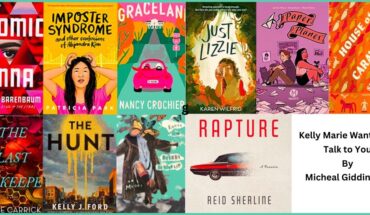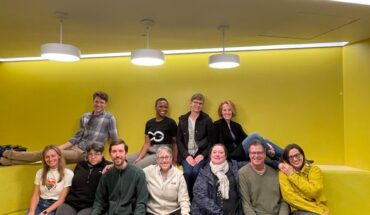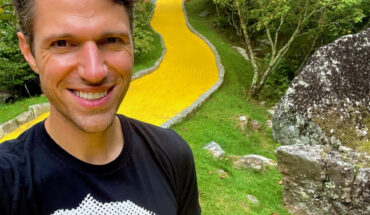 “Once upon a time, a certain soon-to-be billionaire started the trend of collecting star ratings for products on his new website….Star ratings work great for printer cartridges and air fryers, but are unhelpful when it comes to art, especially books.” This is the premise behind a new app called Readerly, touted as a better way to discover books you’ll love. The app was created during the pandemic by three people—Mary Heitkamp, a Grub Street Novel Incubator graduate, her software engineer husband, and a publisher friend.
“Once upon a time, a certain soon-to-be billionaire started the trend of collecting star ratings for products on his new website….Star ratings work great for printer cartridges and air fryers, but are unhelpful when it comes to art, especially books.” This is the premise behind a new app called Readerly, touted as a better way to discover books you’ll love. The app was created during the pandemic by three people—Mary Heitkamp, a Grub Street Novel Incubator graduate, her software engineer husband, and a publisher friend.
An alternative to Amazon and Goodreads, Readerly is a book discovery platform designed to level the playing field for authors, and expose readers to a more diverse range of books. It skips the five-star rating system and offers you book suggestions from like-minded readers. Launched in May 2022, it already has 27,000 users. And it’s FREE!
Read on to hear from co-founder Mary Heitkamp how Readerly came to be, and if it’s the right app for you.
Tracey Palmer: I hear you and your husband came up with the idea for Readerly together. Can you describe how that happened and why? Were you like, sitting around the dinner table and all of a sudden one of you says, “Hey, honey, let’s launch an app to compete with Amazon?”
Mary Heitkamp: That’s actually not too far off! It started with a conversation my husband, Matt, and I were having (it may have been over dinner, in fact) about how hard it was to find books that really resonated with us. Like many readers, we’d turned to best seller lists, Goodreads, and social media, but found that the same few authors and genres tended to dominate. And I knew several writers who had talked about the challenges they faced with marketing their books after they got published, how they needed to get a certain number of reviews and a certain average star rating just for their book to be seen by readers on Amazon.
It was frustrating to think that there were books out there that weren’t being discovered by people who would love them, simply because the author wasn’t well known or because the publisher didn’t have a marketing budget to compete with the Big Five. Amazon became the target of our frustrations because as a supplier, publisher, and owner of the largest book recommendation platform in the world (Goodreads), they have so much power in the book world. There’s a lot said about how they hurt indie bookstores and other small retailers, but I think they’re doing a lot of damage to book discovery as well. They’re not in the business to help you find something different or surprising or relevant; they’re in it to sell you books, which means they’re only going to show you what you’re more likely to buy.
So, Matt and I started talking about building a platform, free from the influence of marketing and profit-driven algorithms, that helped expose readers to a wider range of books, and the idea for Readerly was born.
But while it may have started at our dinner table, we owe a lot to the rest of the Readerly team: our advisor Gill Evans, an award-winning publisher from London, our CEO Erica Coray, a lawyer and avid reader who cares deeply about helping people find themselves and books, and our social media manager Cindy Allman, the woman who started the Read Caribbean movement on Instagram (@bookofcinz). Readerly would not be what it is today without the help of these incredibly smart and passionate book-lovers!
Readerly is up against some stiff competition. What are the main ways it’s different from Goodreads and Amazon etc., and why is it better (in your humble opinion)?
The biggest difference between us and Goodreads/Amazon is that we don’t use a 5-star rating system. Thanks to Amazon, this has become the standard for rating books, but it tends to favor books with general appeal and hurt those not written for the majority. And reducing a book down to 3.5 or 4.2 stars doesn’t tell us what we, as individual readers with unique tastes, will think of it.
We wanted to recreate the real-world experience of getting a great recommendation from a friend you trust. Instead of star ratings, we show you how much your taste in books overlaps with other readers so you can decide whether or not their recommendations resonate with you. It also allows you to expand your reading palate so you don’t get boxed into the same genres and topics. When I find someone who recommends one of my favorite books, I like to take a chance on books they’ve read in genres or topics outside my usual comfort zone.
Another big difference is our style of book reviews. Instead of long commentaries, readers write Gists, which are mini, deconstructed reviews that allow you to share your thoughts on a book in a much more digestible way. Each Gist starts with a quick summary of the book and why you liked it. Then you can add slides about characters, favorite quotes, other books it reminds you of, and links to longer reviews. Our hope is that these are as fun to create as they are to read, and that people who might not have written long reviews will share their recommendations though Gists.
We’ve also taken a slightly different approach to negative reviews. One of my pet peeves is coming across a review that tears a book apart in order to turn off other readers. As a writer, I know the years of hard work that goes into getting a story on the page and published, and these kinds of reviews are not only hurtful to authors, but unhelpful to potential readers. We want to remind people that not every book is written for them. So rather than “Don’t recommend” we use “Not for me” and ask readers to explain why they didn’t relate to the book. We also give them a chance to share something they did like about it, whether that’s the premise, a character, or a single, beautiful sentence. A little compliment can soften the blow of a negative review in a big way.
Finally, as I mentioned above, our main goal was to solve the discoverability problem for lesser known authors. One of the ways we do this is by limiting the frequency with which you see a single book. Every time you save, hide, or mark a book as read on Readerly, we remove that book from your recommendation feed to create more space for other books to shine. And instead of a few influential platforms, publishers, and influencers telling you what to read, you’ll see recommendations from all kinds of readers, regardless of follower count or regularity of Gists!
I’m not great at learning to use new apps, but I found Readerly really simple and easy to use. Can you tell our readers how it works and how they can join?
Readerly is essentially a book discovery app with lots of ways to explore. The main way is through a feed of Gists, which looks a little bit like an Instagram feed (but filled only with books!) where you’ll see recommendations from readers who rate books similarly to you. If you’re interested in seeing what’s popular (because despite our frustration with the dominance of best sellers, we have a bit of FOMO too), you can also explore the most recommended and best-selling books, which you can filter to only the genres you’re interested in.
Some of our most popular features are the interactive map and the timeline, which you can use to find books set in particular countries and decades, as well as to see where reading has taken you. We also have a Reminds Me Of screen, which allows you to pick a book you love and see similar books as recommended by other readers on the platform.
Signing up for Readerly is really easy! You can find and download the app in the AppStore and Google Play. You’ll see a few slides explaining our mission and a quick quiz about your reading preferences and favorite genres. Once you’re in, you can start recommending books and writing Gists, and we’ll start finding like-minded readers to fill your Gist feed. You can also import your Goodreads history so you don’t lose a single book you’ve read. And while we have a paid Readerly+ option with a few bonus features, the core of Readerly and everything I’ve talked about here is completely free!
What are some of the latest new features you’ve added?
Our biggest new feature is the Discussions tab. We really want Readerly to feel like a community, and Discussions is a place where you can interact directly with other readers: discuss books you’ve both read, ask for specific recommendations, or join a literary conversation.
Another recent addition is the ability to edit your book’s metadata, including tags, setting locations, and time periods. Book metadata can be a bit messy, so we’re looking to the Readerly community to help us out. By adding missing data to books they’ve read, they’re making it easier for other readers to find books they’re looking for.
Who is the ideal Readerly user? And what kind of feedback are you getting so far?
We welcome any reader, really! But I think we’ll appeal most to readers who, like us, struggle to work through all the noise to find books they love or can relate to, as well as readers who just love discovering something a little different. We truly believe there’s a book out there for everyone, and whatever your taste in books, we want to help you find like-minded readers who will point you to books you’ll love.
Readerly is also a space for authors (who are readers too, of course). Our goal is to give them a little more power over the discoverability of their published work. When an author claims their books on Readerly, those books automatically get attached to every Gist they write. Rather than having to be a social media personality, an author can simply be a reader. By sharing books they love they’re making their own more visible to a potential new audience.
So far, the feedback has been overwhelmingly positive. I mentioned the team of people who have helped us build Readerly, but our community of readers has really helped shape the platform as well. The very first iteration of the app looks so different from the one we have today, and we owe that to all of the readers who have written in with ideas for new features or feedback on things that weren’t working for them. And while we officially launched in May, we’re always listening to our readers and trying to improve things.
What are your hopes and dreams for Readerly’s future?
I’d be lying if I said I didn’t fantasize about disrupting Goodreads/Amazon’s stranglehold on the book industry, but I know how arrogant that sounds. Still, we have to keep innovating and reimagining book discovery as if we could. In the very least, in a world powered by marketing and algorithms, I’d like to see Readerly become an oasis of genuine book discovery, powered by passionate readers.
Download the Readerly app in the AppStore and Google Play, and give it a try on your mobile device.
Mary Heitkamp is a recent graduate of the Novel Incubator program and cofounder of Readerly, a new book discovery platform. She has an MFA in creative nonfiction from Vermont College of Fine Arts and has published essays in The Chattahoochee Review, 1966: A Journal of Creative Nonfiction, and Numéro Cinq Magazine. She is currently pantsing her way through her first novel.



